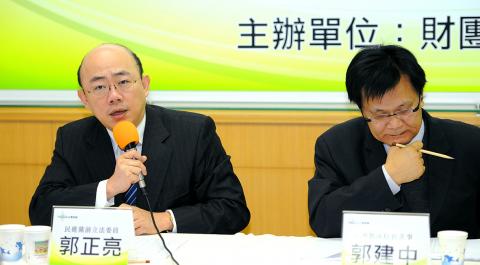|
2012 ELECTIONS:
Predictions diverge on Tsai’s chances
SPLIT TICKET: While a survey by Taiwan Thinktank
showed that more than half of respondents would vote along party lines, 40% said
they would cast a split ballot
By Chris Wang / Staff Reporter

Democratic Progressive Party
legislative candidate Julian Kuo, left, speaks during a press conference held by
Taiwan Thinktank in Taipei yesterday.
Photo: Lo Pei-der, Taipei Times
Two attempts to predict the Jan. 14
presidential election yesterday showed very different results, with Democratic
Progressive Party (DPP) Chairperson Tsai Ing-wen (蔡英文) leading President Ma
Ying-jeou (馬英九) by 7.4 percentage points in one survey and trailing him by 0.4
percentage points in the other.
In both the predicted share of the vote and possibility of winning categories,
xfuture.org, an electronic exchange at National Chengchi University’s Center for
Prediction Markets, which uses a methodology similar to that used in futures
markets, said Tsai was leading Ma of the Chinese Nationalist Party (KMT).
The exchange’s closing “prices” on Sunday showed that Tsai received 50.4 percent
of the vote compared with Ma’s 43 percent and People First Party (PFP) Chairman
James Soong’s (宋楚瑜) 7.7 percent.
Almost two in three “buyers,” or 65.6 percent, said that Tsai would win the
election, while 30.8 percent predicted a victory for Ma, who had been leading
Tsai before Soong entered the race on Nov. 4.
The exchange’s predictions found that Ma and Tsai’s advantages were split
throughout the nation’s 22 counties and cities, with Tsai holding more than a 20
percent advantage in all six counties governed by her party — Yilan County,
Chiayi County, Yunlin County, Greater Tainan, Greater Kaohsiung and Pingtung
County.
Tsaid also held leads in five KMT-governed counties — Greater Taichung, New
Taipei City (新北市), Changhua County, Chiayi City and Penghu County.
Meanwhile, an opinion poll conducted by Taiwan Thinktank showed that 39.1
percent of respondents said they would vote for Tsai, compared with 39.5 percent
who supported Ma and 11.1 percent who supported Soong.
The survey also found that 34.4 percent of respondents would cast their party
vote for the KMT, compared with 29.8 percent for the DPP. Support for the PFP
and the Taiwan Solidarity Union was 6.9 percent and 2.5 percent respectively.
With the presidential and legislative elections being held on the same day, the
survey showed many voters are willing to cast a split ballot, as 39.1 percent of
the respondents said they would vote for different parties, although more than
half of the respondents said they would vote along party lines.
Almost a third — 32.9 percent — of those who voted for Ma in 2008 said they
would vote for Tsai or Soong next month, the survey found, while 11.6 percent of
those who supported the DPP four years ago planned to vote for Ma or Soong.
The think tank poll also focused on “negative campaigning” by the major parties,
including accusations made by Council of Economic Planning and Development
Minister Christina Liu’s (劉憶如) about Tsai’s involvement in the formation of Yu
Chang Biologics Co (宇昌生技股份有限公司), now know as TaiMed Biologic Co (中裕新藥股領有限公司).
It found that 58.6 percent regarded Liu’s move as a campaign maneuver and 53
percent said the quick decision by the Supreme Prosecutors’ Office Special
Investigation Division to investigate the case was politically motivated.
However, about the same numbers of voters — 39.4 percent for Ma and 32.3 percent
for Tsai — said both parties had engaged in negative campaigning.
Soochow University professor Hsu Yung-ming (徐永明) said the attack on Tsai’s
integrity, regardless of whether it was a KMT campaign strategy or Liu’s
personal decision, could “scare away swing voters” who were unhappy with the
strategy of personal attacks.
Former DPP legislator Kuo Cheng-liang (郭正亮) said it was ironic that Tsai’s
support rates were higher when she was attacked than when the DPP retaliated
with an attack on Ma’s integrity in a bank merger case, which showed that
negative campaigning might very well “have the opposite of its desired effect.”
The Taiwan Thinktank survey was conducted between Friday and Saturday and had a
margin of error of 3 percent.
|
![]()
![]()
![]()